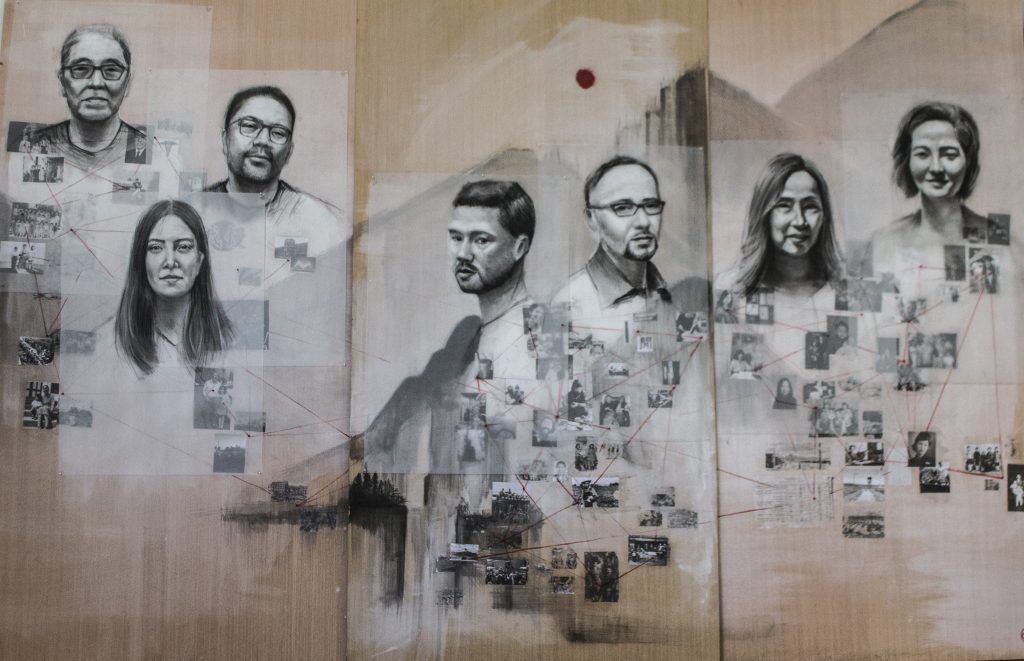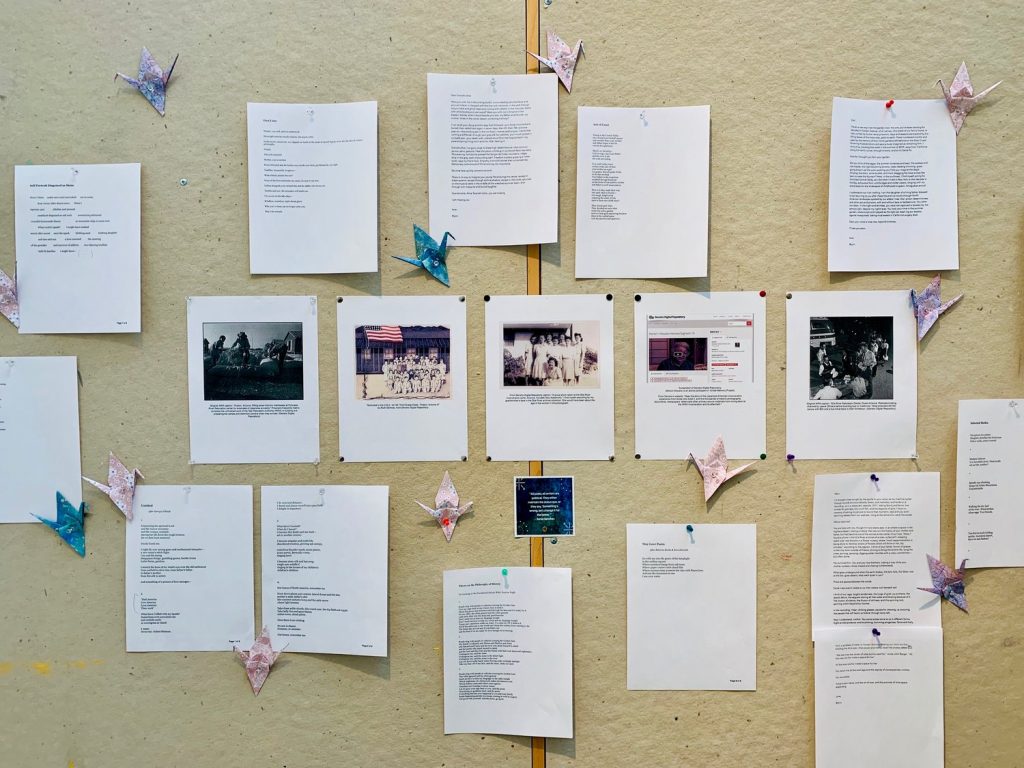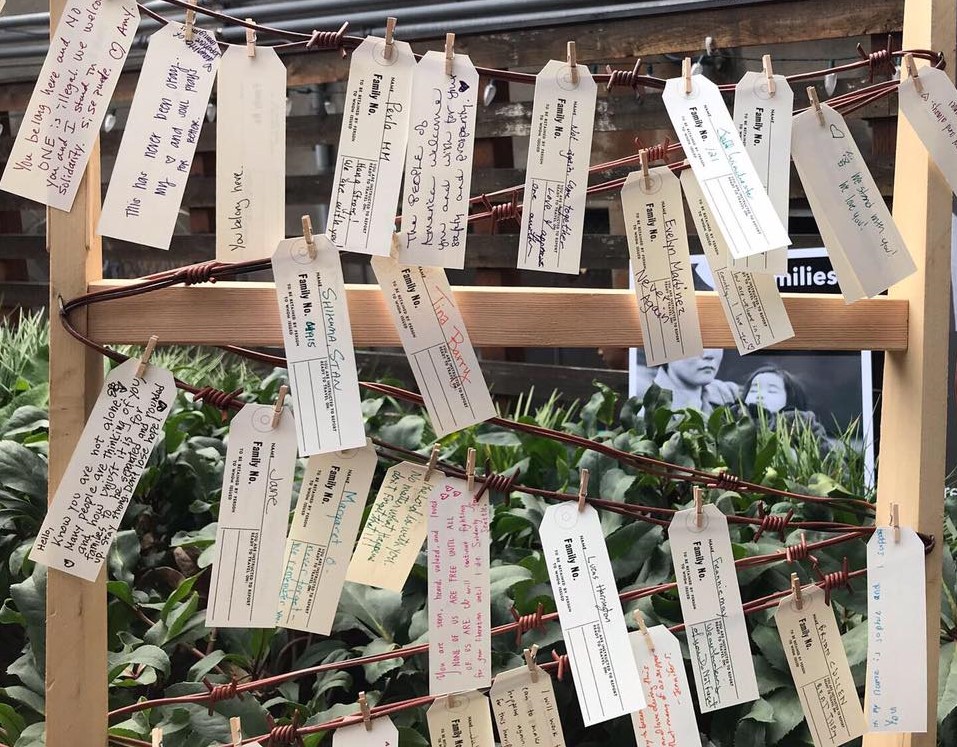November 7, 2019
As we witness everyday reminders that “Never Again” is right now, it’s become clear that stories of Japanese American WWII incarceration matter today more than ever. Last year we launched an artist-in-residence program that allowed us to collaborate with some amazing artists to spread that message far and wide. We continued that program in 2019, and we’re excited to share a look at the incredible work this year’s artists have created.
Mari Shibuya
Mari Shibuya is a fourth generation Japanese American who lives and works as a facilitator, muralist, and artist in Seattle. As a facilitator, Mari focuses on the power of creativity, arts-based practices and storytelling as an avenue for empowering individuals to find their voice, create connection, inspire transformation and develop leadership. As an artist, she strives to create work that reflects on our interconnectedness and makes space for us all to contemplate the forces that give rise to our human experience. “We are the lived expression of the migration of our ancestors,” she says. “The decisions they made in response to the times that they existed in birthed the present day we experience and inhabit, physically, psychically and emotionally. They are the roots from which we grow.”

For her 2019 Densho residency, Mari created a piece that charts three Pacific Northwest Japanese American families’ stories. She explains: “The photos featured beneath the portraits outline each families’ origin in Japan, their immigration story, their incarceration story and the process of cultural assimilation into ‘America.’ What aspects of Japanese culture remain to create the culture of what it means to be Japanese American are highlighted in each constellation indicated by the red threads connecting the past to the present.”
These pieces grew out of three Intergenerational Dialogues Mari hosted with Densho in June and interviews she conducted with each family. “What resulted, portraits of resilience, repression, joy and grief, and the fact that inherent to the experience of being Japanese American is the embodiment of the Japanese concept of ‘Gaman,’ meaning ‘enduring the seemingly unbearable with patience and dignity.’ We heal the past by weaving the pain that our ancestors endured into our lives and holding it, grieving it and celebrating their resilience in the face of adversity.”
Brynn Saito
Brynn Saito is a Korean American and Japanese American poet, educator, and organizer, born and raised in Fresno, CA. She is the author of two books of poetry, Power Made Us Swoon (2016) and The Palace of Contemplating Departure (2013), winner of the Benjamin Saltman Award, and a finalist for the Northern California Book Award. She also co-authored, with Traci Brimhall, the chapbook Bright Power, Dark Peace (2016). Along with Fresno artist, farmer, and writer, Nikiko Masumoto, Brynn co-founded and co-directs Yonsei Memory Project (YMP), utilizing arts-based inquiry to generate dialogue connecting the WWII incarceration of the Japanese American community with current struggles for justice.

Brynn writes, “In the spring of 1942, my grandmother, Alma Teranishi, and my grandfather, Mitsuo Saito, were forced from their homes in California’s Central Valley and sent to a concentration camp built on the sovereign land of the Gila River Indian Community in southern Arizona. They met, married, and had a daughter while imprisoned. Along with approximately 120,000 Japanese immigrants and Japanese Americans on the West Coast of North America, Mitsuo and Alma were imprisoned in yet another massive, illegal violation of freedom in a federally-authorized act later attributed to ‘race prejudice, war hysteria, and a failure of political leadership.'”
This past summer, almost eight decades later, Brynn visited the ruins of the Gila River concentration camp with her father. In the time immediately after that personal pilgrimage, she wrote letters to family and friends reflecting on the legacy of the WWII incarceration. Brynn’s project, “Dear — “, is a living archive of those letters and responses, and she invites readers to write their own letters as well. In February 2020, Brynn will hold a community reading and letter-writing workshop commemorating Day of Remembrance and launching the online letter archive and a chapbook of poems, images, and letters.
—
The ArtsFund Multicultural Arts Project and The Seattle Office of Arts & Culture generously provided support for this artists-in-residence program. Thank you, to these local programs for their meaningful impact and for helping us to engage our community through art!
Header image: An interactive art-activism installation curated by Erin Shigaki at Seattle’s Hai! Japantown festival in August 2019 — one of several smaller-scale art projects we were able to support through our 2019 Densho Artist Initiative.
